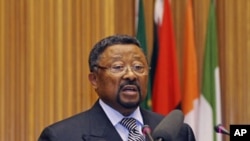An African Union [AU] official says there could be changes in the leadership, as heads of state and government vote this week to elect a chairperson of the continental body at the summit in Ethiopia’s capital, Addis Ababa.
The leaders are also scheduled to elect the deputy chairperson of the AU commission, as well as ten members of the Peace and Security Council (PSC), and one judge of the AU Ad-hoc administrative tribunal. South Africa’s Home Affairs Minister, Nkosazana Dlamini-Zuma, will challenge incumbent chairperson Jean Ping.
“The heads of state are engaging among themselves and building coalitions around regional communities and blocs to create a backup for each candidate,” continued Keizire Boaz, adviser at the AU. “So, Jean Ping will really be meeting a very stiff competition from the South African former foreign affairs minister.”
Boaz says an official agenda of the summit will be presented Wednesday ahead of the arrival of the heads of state and government.
“Today will be the date dedicated to sensitizing the document the ambassadors and the permanent representatives committee to the African Union will be put into a form that can better inform participants, [ahead of] the meeting of the foreign affairs ministers, who will deliberate before the heads of state discussions,” said Boaz.
Critics say the African Union has not been overly effective in resolving conflicts citing ongoing clashes in Somalia, where hard-line Islamic insurgents, including al-Shabab, are battling AU peacekeeping forces. They said the continental body has failed combat violent activities of the Lord’s Resistance Army rebels, who have been accused of rape and kidnappings in East and Central Africa.
But, Boaz says African leaders will discuss new ways of resolving conflicts and security problems in Africa.
“These challenges have brought specific discussions at the heads of state level where decisions will be made on directing the political orientation on some of the key issues on the continent,” said Boaz. “One of the agreed charters is how the commission will be engaging in resolving conflict. And, the main focus here is going to be Somalia and other regions that are conflict-prone areas.”
Boaz said there is a paradigm shift on how conflict could be resolved.
“There is a new thinking and there is [an] aggressive approach to how these conflicts should be addressed,” he said.
The AU leaders are expected to consider the recommendations of its commission’s report on the implementation of previous decisions of the Executive Council and the Assembly, the report of the Peace and Security Council on its activities and the state of peace and security in Africa, including the activities of the Panel of the Wise, and the report of Ethiopian Prime Minister Meles Zenawi, who is chairperson of the NEPAD Heads of State and Government Orientation Committee.




